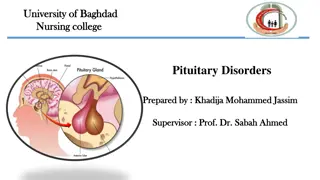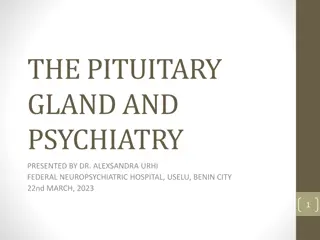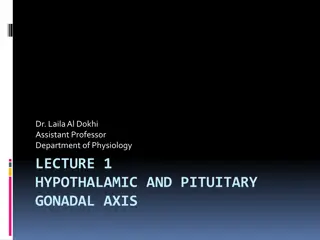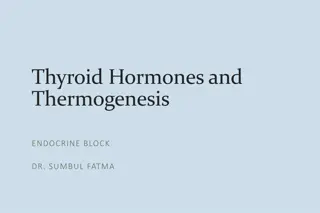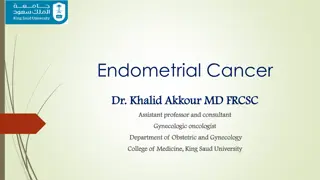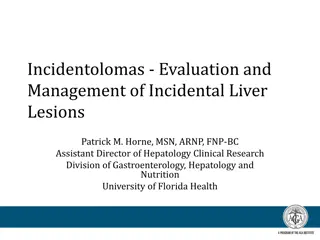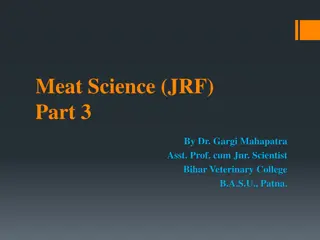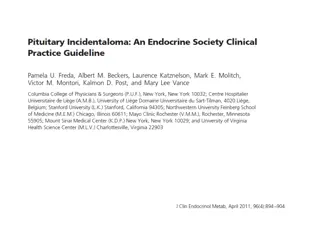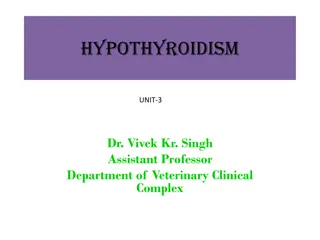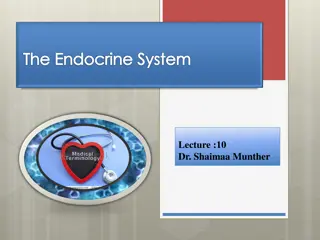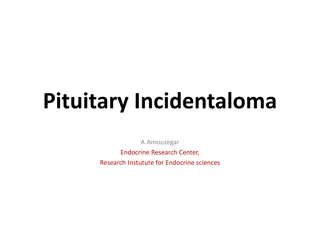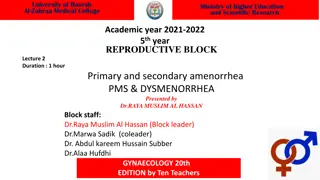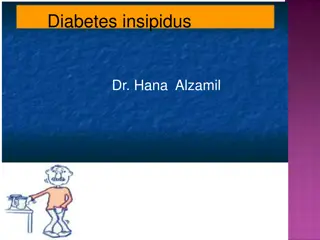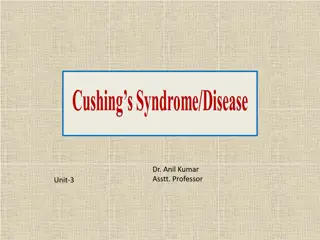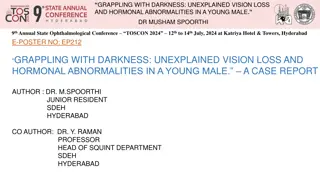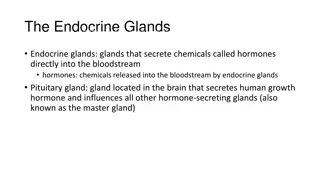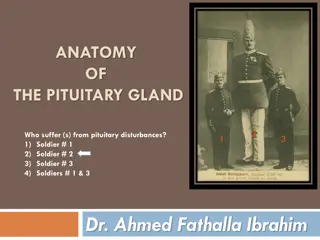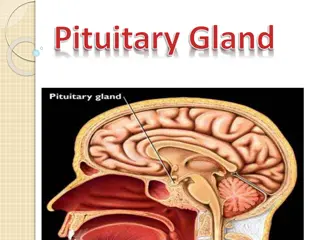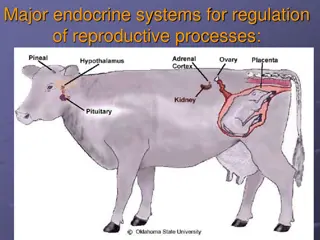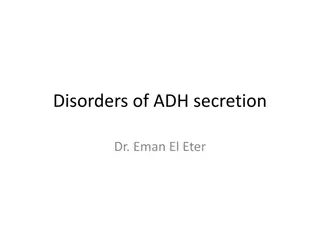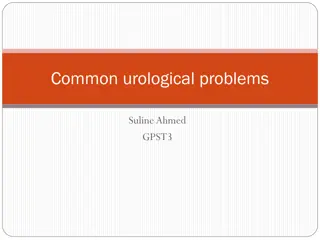Pituitary Disorders
Pituitary disorders, often caused by tumors, can disrupt hormone production leading to various symptoms like weight gain, vision problems, and hormonal imbalances. The pituitary gland plays a crucial role in regulating bodily functions through hormone secretion. Factors such as tumor growth, head in
0 views • 25 slides
Understanding Pituitary Gland Functions in Endocrinology Course
Explore the intricate workings of the pituitary gland in endocrinology, delving into hypo- and hyperfunction aspects, hormonal regulation, and physiological characteristics. Learn about the crucial role of hormones, their actions on target organs, and the specificity of their interactions with cellu
6 views • 71 slides
APPROACH TO SPLENOMEGALY
The spleen, an important organ in the reticuloendothelial system, plays key roles in red blood cell quality control, antibody synthesis, and removal of bacteria and red blood cells. Understanding normal spleen size and functions is crucial in diagnosing splenomegaly, which can be due to various caus
4 views • 33 slides
Understanding Hypothalamus and Pituitary Hormones in Clinical Pharmacology
Peptides and glycoproteins are secreted by the hypothalamus and pituitary, regulating anterior pituitary hormones. Hormones like adrenocorticotropic hormone (ACTH) and corticotropin-releasing hormone (CRH) play crucial roles. Synthetic adrenocorticosteroids have limited the use of corticotropin for
1 views • 28 slides
Understanding Sexual and Reproductive Anatomy in 5th Grade Lesson
Explore the sexual and reproductive anatomy in a 5th-grade lesson. Learn about the pituitary gland, its role in hormone production, why clothes may feel too small due to growth hormones, and the biological male and female reproductive systems. Discover the organs involved in reproduction and their f
5 views • 8 slides
Understanding the Pituitary Gland: Implications in Psychiatry
This presentation by Dr. Alexsandra Urhi delves into the anatomy, function, and psychiatric implications of the pituitary gland. It explores the interplay between endocrine structures, the CNS, and psychotropic drugs' effects on the pituitary gland.
0 views • 35 slides
Overview of Pituitary Gland: Structure, Function, and Relationships
The pituitary gland, also known as the hypophysis, is an endocrine gland located at the base of the brain. It is divided into two main parts: the adenohypophysis and the neurohypophysis. The gland plays a crucial role in hormone regulation and is closely related to neighboring structures such as the
0 views • 26 slides
Understanding Uterine Cancer and Postmenopausal Bleeding
Dr. Khalid Akkour, Assistant Professor of Gynecologic Oncology at King Saud University Medical City, provides insights on uterine cancer and postmenopausal bleeding. The structured OSCE discusses important aspects such as taking a focused history, age, ethnicity, past gynecologic and obstetric histo
0 views • 154 slides
Buy HGH Online - buyusapeptides.com
HGH, or Human Growth Hormone, is a peptide hormone secreted by the pituitary gland. It stimulates growth, cell reproduction, and cell regeneration in humans, making it vital for development. Naturally produced in the body, HGH levels peak during chil
1 views • 5 slides
Insights into Human Growth Hormone and Its Medical Applications
Human Growth Hormone (HGH), a key hormone secreted by the anterior pituitary gland, plays a crucial role in stimulating growth and metabolism. Its therapeutic applications range from treating growth hormone deficiency in children to genetic engineering for pharmaceutical production. HGH has made sig
0 views • 18 slides
Understanding the Hypothalamic-Pituitary-Gonadal Axis in Reproductive Physiology
Explore the intricate relationship between the hypothalamus, pituitary gland, and gonads in regulating reproductive functions. Learn about hormone definitions, hypothalamic-pituitary interactions, gonadotropic hormones, and feedback mechanisms crucial for reproductive control.
0 views • 13 slides
Understanding Thyroid Hormones and Thermogenesis in Endocrinology
This lecture covers the types, biosynthesis, actions, regulation, and clinical implications of thyroid hormones. It explains the functions of thyroxine (T4) and tri-iodothyronine (T3), their synthesis in the thyroid gland, and their transport in the body. The role of thyroid hormones in thermogenesi
2 views • 30 slides
Understanding Endometrial Cancer: Risk Factors, Diagnosis, and Management
Endometrial cancer, the most common gynecological malignancy in women, presents with abnormal uterine bleeding and affects women mainly during menopause. Risk factors include hormonal stimulation and estrogen levels. Differentiating between types of endometrial cancer can impact treatment decisions.
3 views • 31 slides
Evaluation and Management of Incidental Liver Lesions
Understanding the natural history, evaluation, and management of benign liver lesions is crucial for diagnosing incidental liver findings. Common benign liver lesions include hepatic hemangioma, focal nodular hyperplasia, hepatic adenoma, and hepatic cyst. Differential diagnosis plays a key role in
0 views • 37 slides
Understanding the Microscopic Structure and Function of the Pituitary Gland
Explore the detailed histology of the pituitary gland, focusing on its adenohypophysis and neurohypophysis components. Learn about the diverse parenchymal cells, including acidophils, basophils, and chromophobes, and their respective functions in hormone production. Dive into the significance of the
0 views • 6 slides
Utilization of Glands and Biochemicals in Meat Science Research
Glands play a crucial role in meat science research, with various organs such as pancreas, adrenal glands, and parathyroid gland providing valuable biochemicals like insulin, thyroxine, and corticosteroids. The extraction methods and applications of these glands in food science and medicine are deta
0 views • 25 slides
Understanding Hormones and their Role in the Body
Hormones are chemical messengers that play a crucial role in regulating various metabolic functions in the body. They are transported through the bloodstream to tissues and organs, affecting processes like growth, metabolism, and reproduction. Some hormones have autocrine and paracrine effects in ad
0 views • 25 slides
Pituitary Incidentaloma: Evaluation and Management Recommendations
A pituitary incidentaloma is an unsuspected pituitary lesion discovered incidentally during imaging studies not done for lesion-related symptoms. Patients should undergo a thorough evaluation for hormone hypersecretion and hypopituitarism, including clinical and laboratory assessments. Recommendatio
0 views • 69 slides
Understanding Menstruation and Ovulation Cycle in Women
Menstruation, the cyclic uterine bleeding, is a result of hormonal interplay. It signifies ovarian events controlled by the hypothalamic-pituitary axis. The menstrual cycle, spanning from one period to the next, involves the release of ova and hormones like estrogen and progesterone. Menstruation ty
0 views • 49 slides
Approach to Headache and Neurological Symptoms in Clinical Practice
Comprehensive overview of primary and secondary headaches, red flags, and patterns in neurological presentations. Discusses distinguishing features, differential diagnoses, and management approaches for various conditions affecting the central and peripheral nervous system. Highlights important cond
0 views • 16 slides
Hypothyroidism in Dogs: Causes, Clinical Signs, and Diagnosis
Hypothyroidism in dogs is an endocrine disorder characterized by reduced secretion of thyroid hormones, leading to a range of clinical signs such as lethargy, weight gain, and hair loss. Common in medium to large breeds, this condition can result from primary thyroid dysfunction or pituitary-depende
0 views • 11 slides
Understanding the Endocrine System: Key Concepts and Functions
The endocrine system, consisting of glands that release hormones into the bloodstream, plays a crucial role in regulating various body processes like metabolism, growth, reproduction, and stress response. Key glands include the pituitary, thyroid, pancreas, adrenal, ovaries, and testes, each produci
0 views • 34 slides
Understanding Pituitary Incidentalomas: Causes, Diagnosis, and Management
Pituitary incidentalomas are unexpected lesions found during imaging studies for unrelated reasons. Evaluation and management recommendations rely heavily on clinical experience due to limited literature on the topic. Etiology includes mostly pituitary adenomas and a small percentage of nonpituitary
0 views • 37 slides
Development of Maxillary Prominences and Secondary Palate in Embryonic Development
New outgrowths from the medial edges of the maxillary prominences form the shelves of the secondary palate. Fusion of these palatal shelves involves complex cellular changes, such as elevation after the withdrawal of the tongue and alterations in epithelium leading to adhesion and fusion. The fate o
0 views • 23 slides
Understanding Primary and Secondary Amenorrhea, PMS, and Dysmenorrhea in Gynecology
Explore the concepts of primary and secondary amenorrhea, PMS, and dysmenorrhea in gynecology through detailed lectures and learning objectives at the University of Basrah Al-Zahraa Medical College. Topics include differentiating between primary and secondary amenorrhea, management strategies, cause
0 views • 31 slides
Understanding Diabetes Insipidus: Types, Causes, and Symptoms
Diabetes insipidus (DI) is a disorder caused by a deficiency of anti-diuretic hormone (ADH), leading to the excessive passage of diluted urine. Central DI results from pituitary or hypothalamus issues, while nephrogenic DI occurs when the kidneys fail to respond to ADH. Common causes include brain t
0 views • 22 slides
Understanding Cushing Disease in Dogs and Cats
The pituitary gland, or "Master Gland," plays a crucial role in hormone regulation in the body. Cushing disease, a common endocrine disorder in middle-aged to older dogs and cats, is often caused by tumors in the pituitary or adrenal glands. Symptoms include increased thirst, appetite, panting, obes
0 views • 22 slides
Unexplained Vision Loss and Hormonal Abnormalities in Young Male - A Case Report
A case report presented at the 9th Annual State Ophthalmological Conference TOSCON 2024 discusses a young male patient grappling with unexplained vision loss and hormonal abnormalities. The patient exhibited symptoms of headache, diminished vision in the left eye, and an unusual head-turning behavio
0 views • 6 slides
Understanding How Hormones Interact: The Endocrine System
The endocrine system comprises glands that release hormones into the bloodstream, influencing various bodily functions. Key glands include the pituitary, pineal, thyroid, pancreas, gonads, and adrenal glands, each playing a crucial role in regulating metabolism, growth, stress response, and reproduc
0 views • 5 slides
Understanding the Endocrine System: Hormones, Glands, and Regulation
The endocrine system, comprising glands such as the pituitary, thyroid, pancreas, and more, produces hormones that regulate various bodily functions. These hormones target specific cells with receptors, influencing metabolism, growth, energy usage, and more. By understanding how hormones interact wi
0 views • 12 slides
Understanding the Pituitary Gland: Anatomy, Functions, and Disorders
The pituitary gland, also known as the master endocrine gland, plays a crucial role in regulating various hormonal functions in the body. Learn about its anatomy, position, subdivisions, important relations, and common disturbances. Explore how soldiers and individuals like them can be affected by p
0 views • 17 slides
Understanding the Endocrine System: Functions, Organs, and Disorders
The endocrine system, essential for bodily functions and growth, consists of key parts such as the hypothalamus, pituitary gland, thyroid gland, and more. It helps maintain homeostasis and can be affected by environmental factors like drugs and stress, leading to conditions such as Cushing syndrome.
0 views • 9 slides
Understanding the Endocrine System: Functions and Glands Explained
Explore the intricacies of the endocrine system with a focus on its functions such as metabolism, growth, emotions, and more. Learn about key endocrine glands like the hypothalamus and pituitary, their roles in hormone regulation, and their impact on various bodily processes. Discover the significan
0 views • 17 slides
Understanding the Posterior Pituitary Gland and Its Hormones
The posterior pituitary gland, a key part of the endocrine system, plays a vital role in hormone secretion. It controls the release of oxytocin and vasopressin, influencing social bonding, reproduction, and childbirth. Learn about the anatomy, function, and disorders associated with this important g
0 views • 26 slides
Understanding the Pituitary Gland: Structure, Function, and Hormones
The pituitary gland, located at the base of the brain, comprises two main portions - the anterior lobe (adenohypophysis) and the neurohypophysis. The anterior lobe consists of various cell types that secrete hormones like GH, prolactin, TSH, ACTH, FSH, and LH. GH, also known as STH, plays a crucial
0 views • 17 slides
Understanding Amenorrhea: Definition, Types, Causes, and Management
Amenorrhea, the absence of menstruation, is classified into primary and secondary types. Primary amenorrhea refers to the failure of menarche to occur by a certain age, while secondary amenorrhea is the absence of menstruation in women of reproductive age for three or more months. The condition can
0 views • 24 slides
Endocrine Systems in Reproductive Regulation
The endocrine system plays a crucial role in regulating reproductive processes by secreting hormones that influence cellular activity. This system involves ductless glands like the hypothalamus, pituitary gland, and other endocrine glands working together in a feedback mechanism. Hormones of various
0 views • 19 slides
Essentiality of Cr(VI)-Induced Mutagenesis in Small Intestinal Tumor Development in Mice
Cr(VI)-induced mutagenesis is a key event in the mode of action for small intestinal tumors in mice, with the question of whether it is an essential step in tumor development. The interaction of cellular components with Cr leads to cell proliferation, hyperplasia, and ultimately mutagenesis. Differe
0 views • 4 slides
Understanding Disorders of ADH Secretion: Causes, Symptoms, and Treatments
Disorders of ADH secretion, such as Diabetes Insipidus and Syndrome of Inappropriate ADH Secretion (SIADH), present various manifestations like polyuria, polydipsia, and dehydration. Different types of Diabetes Insipidus have specific causes and treatments. Central DI results from pituitary gland da
0 views • 12 slides
Management of Benign Prostatic Hyperplasia (BPH) in Men: Diagnosis and Treatment Guidelines
Benign Prostatic Hyperplasia (BPH) is a common urological problem in men, especially those over 45 years old. This article discusses the diagnosis and management of BPH, including symptoms, impact on quality of life, diagnostic steps, lifestyle modifications, medication options like alpha blockers a
1 views • 15 slides
